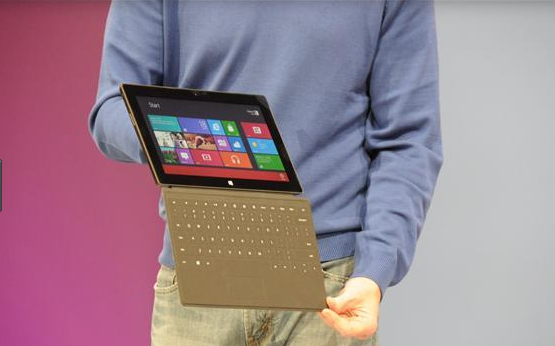Now is the claim that Microsoft went from 0 market share to 7.4% true? Yes it is, but it should be clearly defined as a year to year comparison. In Q1 2012 Microsoft did not have a tablet so there was no way to have a positive market share. Window RT tablets were not launched until October 2012 which would have been the beginning of Q4 12. In that time Microsoft grabbed an estimated 1.6% of the market share (which is about 1 Million tablets). This means that in a single quarter Microsoft based tablets only grew by 5.8% which is a much less impressive headline than trying to claim 7.4% and 3 million tablet sales in a single quarter. This is compared to 14.9% drop in market share for Apple and a 9.2% increase for Android.
Microsoft’s launch quarter for Window 8/RT was barely a drop in the bucket compared to the launch of devices like the iPad, Tab, and Transformer. Overall Microsoft has done fairly good with their tablet sales and we can see a direct impact of Windows 8 Pro on tablets Vs Windows RT as Microsoft’s sales have increased Quarter to Quarter, but even at 7.4% that cannot be considered anything more than a niche market. It is not an impressive leap into the market and consumer hesitation is one of the biggest reasons for the slow sales. According to Strategic Analysis and others a small distribution channel and a lack of broad app infrastructure is limiting Microsoft’s penetration into the market. Added to that is the stark shift form the icon based Android and iOS systems to the tile based Windows 8 and RT. The change is enough to put many people off of the new tablets and is one of the more common reasons for return (we saw many open box Window RT tablet at Best Buy).
Both of Microsoft’s mobile offerings (Window 8/RT and Windows Phone 8) are lagging behind the competition as of this writing and will probably continue to do so until Microsoft can assemble a better assortment of applications and also sorts out a few work flow problems in both Windows 8 and Windows RT. It is possible that some of these issues will be addressed in Windows 8.1, but we are not entirely certain that they will. Traditionally Microsoft has not been able or willing to make major changes to an OS (look at Vista) and instead concentrate on building the next one with the more significant changes.
This could potentially put Windows based tablets in the slow lane until Microsoft is ready to release Windows “9” (or whatever they will call it then). We would like to see Microsoft pull out and gain more traction in the tablet and mobile market, but we also would like to see them drop their cloud push. This insistence on using Microsoft Accounts for everything is not what consumers want and the cloud is becoming exposed as a very dangerous place to store any data which further alienates many users who might otherwise consider a Microsoft tablet as an option. Unfortunately Microsoft needs to push this to build a solid revenue stream that they can maintain outside software sales, which puts them in a very bad position for now. So while Microsoft can be happy that Windows 8 Pro has come to the rescue of Windows RT for tablet market share they have to understand that these numbers are nothing to write home about.
What do you think about Windows 8/RT? Tell us in our Forum




